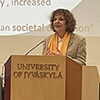The next Linguistics Circle Seminar will be held on Wednesday 5 December from 12:00 to 14:00 in Hall C Gateway Building (GW HC).
Prof. Holger Mitterer, University of Malta, will be talking about 'Glottal speech sounds in German: phonological status and acquisition by late L2 learners'.
Prof. Holger Mitterer, University of Malta, will be talking about 'Glottal speech sounds in German: phonological status and acquisition by late L2 learners'.
Abstract
The glottal stop (coded as ‘q’ in Maltese) is a speech sound that is a phoneme in Maltese but assumed to only be a boundary marker in German. In contrast with this point of view, results from a word recognition task show that the two are similar. Additionally, German /h/ also behaves like the glottal stop.
This indicates that German has two glottal consonants: /h/ and glottal stop. This has implications for teaching German to late learners (L2 learners) with native languages that do not contain glottal consonants. Following the orthodox view, /h/ should be easy to acquire as it is perceptually distinctive from all other sounds of German and the native language of the L2 learners. With the glottal stop added, the /h/ and glottal stop represent a sound pair that should be difficult to distinguish. We therefore tested the acquisition of these consonants by Italian L2 learners of German in production and perception. In production, L2 learners performed moderately well with about 70% native-like productions. However, omissions (dropping /h/ or glottal stop) and exchanges (using /h/ were the glottal stop would have been appropriate) were observed for both target sounds with similar frequencies.
In perception, listeners were able to hear a difference if asked explicitly but ignored the difference for word recognition. Again, glottal stop and /h/ behaved similarly. This is surprising given the head start that /h/ has over glottal stop: Listeners are constantly reminded of /h/ through orthographic coding and only /h/ is discussed in high-school education. These results suggest two conclusions: first, perception and production are skills that are acquired relatively separate in L2 acquisition. Secondly, explicit instructions on how to use a new sound in an L2 have little effect on actual attainment, which seems to be governed by implicit acquisition. This, in turn, means that natural phonological acquisition is still possible for late learners, even though they operate less efficiently after specialization for the first language(s).
This indicates that German has two glottal consonants: /h/ and glottal stop. This has implications for teaching German to late learners (L2 learners) with native languages that do not contain glottal consonants. Following the orthodox view, /h/ should be easy to acquire as it is perceptually distinctive from all other sounds of German and the native language of the L2 learners. With the glottal stop added, the /h/ and glottal stop represent a sound pair that should be difficult to distinguish. We therefore tested the acquisition of these consonants by Italian L2 learners of German in production and perception. In production, L2 learners performed moderately well with about 70% native-like productions. However, omissions (dropping /h/ or glottal stop) and exchanges (using /h/ were the glottal stop would have been appropriate) were observed for both target sounds with similar frequencies.
In perception, listeners were able to hear a difference if asked explicitly but ignored the difference for word recognition. Again, glottal stop and /h/ behaved similarly. This is surprising given the head start that /h/ has over glottal stop: Listeners are constantly reminded of /h/ through orthographic coding and only /h/ is discussed in high-school education. These results suggest two conclusions: first, perception and production are skills that are acquired relatively separate in L2 acquisition. Secondly, explicit instructions on how to use a new sound in an L2 have little effect on actual attainment, which seems to be governed by implicit acquisition. This, in turn, means that natural phonological acquisition is still possible for late learners, even though they operate less efficiently after specialization for the first language(s).



